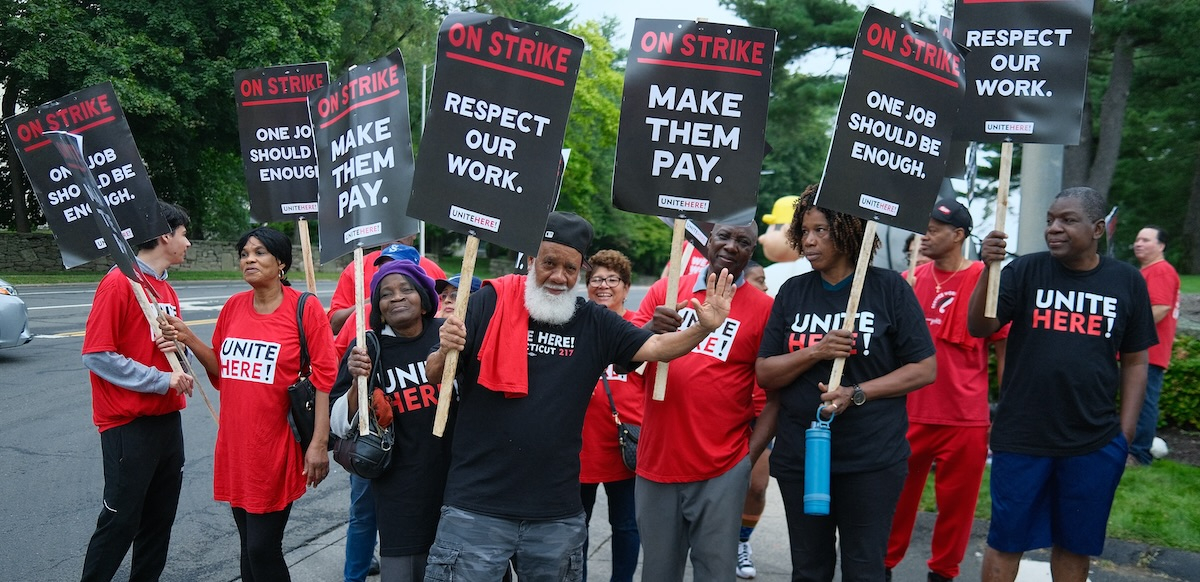10,000 Hotel Workers Struck on Labor Day Weekend, More Could Follow

Striking hotel workers in Greenwich, Connecticut, walked a picket line on Labor Day weekend. The union’s top demands are higher pay and more staff to do the work. Photo: Unite Here Local 217.
More than 10,000 hotel workers across nine cities went out on a rolling strike Labor Day weekend after contract talks with the Hilton, Hyatt, and Marriott hotel chains stalled. They are members of UNITE HERE.
“We came to the decision to go on strike because of all the success other unions have had,” said Christian Carbajal, a market attendant who has worked at the Hilton San Diego Bayfront for 15 years. “[It’s frustrating] that we have to go this far to be given a fair wage” to live in one of the most expensive areas in the country, he said.
“I thought about how hard I work. There are days I have to run to finish up a room, when my supervisor tells me there are people at the front desk waiting,” said Daniela Campusano, a room attendant at Hilton’s Hampton Inn & Homewood Suites Boston Seaport who has worked in the industry for over 20 years. “And they are not taking that into account,” she said in Spanish.
While workers in Boston, Greenwich, Honolulu, Kauai, San Francisco, San Jose, Seattle, and Baltimore are back on the job, workers at the Hilton San Diego Bayfront have opted to remain on strike indefinitely.
MORE STRIKES COULD FOLLOW
Approximately 40,000 hotel workers across 20 cities in the U.S. and Canada have union contracts expiring this year, and additional walkouts could soon follow: some 15,000 workers have voted to authorize a strike, according to the union.
With no master contract in place, workers must negotiate with each company in each city. The campaign is coordinated across locations with overlap between proposals. Shared demands include automatic daily housekeeping and a joint contract expiration date.
In addition to low pay and unaffordable health care, workers cited frustration with inconsistent hours and unsustainable workloads. “You don’t know how many rooms you’ll be asked to clean,” said Sonia Davila, a room attendant who has worked at the Hyatt Regency Greenwich in Connecticut for two years.
Some days, she’s asked to clean as many as 13 check-out rooms over the span of eight hours—an exhaustive process that involves stripping bedsheets, dusting, vacuuming, replenishing supplies like coffee and sugar, changing towels, making beds, and sanitizing toilets.
“It’s pure adrenaline … As I’m working on one thing I’m already looking to the next,” she said in Spanish.

SUPPORT LABOR NOTES
BECOME A MONTHLY DONOR
Give $10 a month or more and get our "Fight the Boss, Build the Union" T-shirt.
Francisco Tobias, a banquet captain and shop steward who has worked at the Hyatt Regency Greenwich, Connecticut, for 30 years, said the strike is an avenue to win improvements for the next generation of workers. “I’ll be retiring soon … but for people who are starting to work at the hotel, who will stay like I did for several years, I want them to have a pension that will help them when they retire,” he said in Spanish. The pension is a core demand for the Connecticut workers.
AN INCOMPLETE RECOVERY
Covid-19 wreaked havoc on the hospitality industry, with more than 3.5 million jobs lost between February 2020 and 2021. Across the U.S. and Canada, 98 percent of UNITE HERE members were laid off at the peak of the pandemic. Though most have gone back to work, the recovery has been bumpy and incomplete. Bookings now exceed pre-pandemic levels and operating profits now surpass pre-Covid figures, but staffing cuts made during the pandemic have yet to be restored.
Hotel bosses, meanwhile, are doing just fine. Marriott International announced a net income of $722 million for the second quarter of 2024, with the Hyatt and Hilton not far behind. The pandemic provided cover for understaffing and service cuts that many hotel operators have since gladly embraced, swapping employees for self service kiosks and relying on fewer workers to pick up more work.
Hotel skeleton crews do their best to keep up with the demands of the job, but Yenifer Alonso, a housekeeper in the public space department at Hilton’s San Diego Bayfront, says it’s not always possible. During ComicCon, her crew of five was tasked with disposing of trash. By the time they had finished their rounds, she said, “the trash was already full.”
To maintain understaffing, hotel bosses lean on fake environmentalism. In recent years, many hotel chains have encouraged guests to opt out of daily room cleanings under the guise of sustainability. While this may sound noble, it’s housekeepers who pay the price.
Rooms that are not cleaned throughout a guest’s stay require more work to clean at time of check-out, leaving housekeepers scrambling to keep up but with no reduction in their daily room quota, said Campusano.
When a guest adds a “Do Not Disturb” sign on their door, “We report that to our supervisor,” she said. Then the supervisor redirects them to another room, “but it’s almost always a checkout room, which is harder.”
SOLIDARITY IN ACTION
Though most workers are back on the job, many say that the experience of striking will have an impact long after negotiations have concluded. “A lot of the people who I didn’t expect to take on leadership roles have surprised me,” said Carbajal. “[They] have been the first ones to take the bullhorn and start a chant.”
“Many people were scared,” said Campusano. “In the beginning they would say, ‘It's my first [strike], I'm scared, I have to pay my bills,’ but at the end of the day it surprised us when all of us decided to walk out.”




